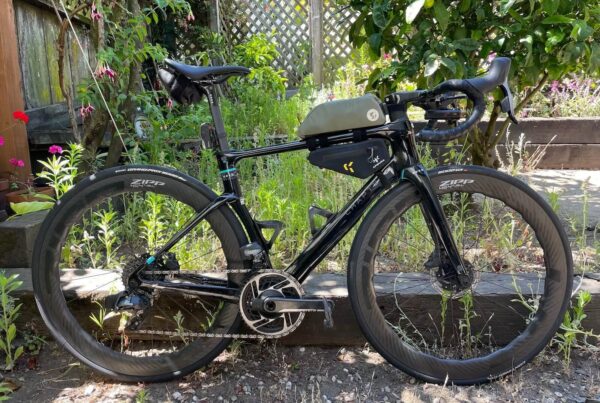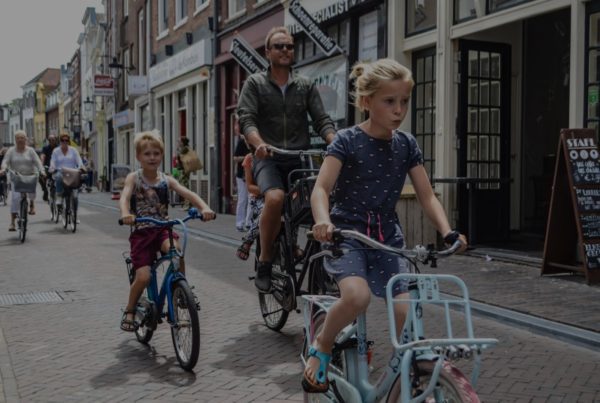Police and lawmakers protect drivers who open their doors into passing cyclists.
By Bob Mionske
The 56-year old cyclist never saw the driver; the driver never saw the cyclist. But did the cyclist see the car door when it opened in his path?
Probably. I know I saw the car door that I struck as it was opening. I saw it, but it was a passenger door, literally swung open as I was passing to the right of a line of stopped vehicles (this is legal in Oregon). It happened so quickly I was unable to stop, unable to take evasive action. I just slammed into it, hitting it the edge of the door with my forearm, shin and neck. The impact brought me to a sudden and immediate tangled-with-the door stop. Let me put it this way—the profile of the door edge was not designed with cyclists safety in mind, and the top of the door angled back like a saber, just missing my carotid artery.
I was lucky; although I was injured, my injuries weren’t severe. The 56-year old cyclist wasn’t as fortunate. When he slammed into the door that was suddenly flung open into his path, he fell to the ground, and suffered serious head injuries. He’s on life support now, in critical condition in a Montreal hospital.
Police quickly absolved the driver of any blame, noting that the car was “legally parked,” and the cyclist was not wearing a helmet.
Oh. I see.
But what about Section 430 of the Highway Safety Code, which prohibits the driver from opening his car door “without ascertaining that he can perform this maneuver safely”? Why are Montreal Police commenting on the legality of the driver’s parking job, when the only relevant legal issue is whether the driver observed his duty to safely open his car door?
For that matter, why did Montreal Police point out the cyclist’s lack of a helmet? Are they suggesting that a helmet would have prevented the collision?
Well, probably not. But they are probably implying that a helmet would have prevented the cyclist’s injuries—and that is an implication that is not supported by any evidence in this collision.
Just to be clear, I’m not saying that a helmet would not have prevented the cyclist’s injuries. I am saying that we don’t really have any real evidence one way or another on that, so it’s impossible to draw any conclusions that a helmet would have prevented the cyclist’s injuries.
Montreal Police also seem to be implying that the cyclist was somehow “in the wrong” because he was not wearing a helmet, but it does not appear that Montreal has a mandatory helmet law.
But none of that seems to have mattered in the outcome of the case. Although police declined to press charges against the driver, it wasn’t because the cyclist wasn’t wearing a helmet, and it wasn’t because the driver had done an exemplary job of parking his car.
It was because the dooring was “an accident.”
Get it? If the driver had intentionally attacked the cyclist with his car door, that might be a different matter. But this was no brutal assault. It was just an accident.
You still don’t get it? Neither do I.
No, actually, it’s the Montreal Police who don’t get it. There’s nothing in the Highway Safety Code requiring drivers to “intentionally” break the law before they can be charged with a violation. If you’re speeding, you can be charged with speeding, whether you knew you were speeding or not. If you fail to stop at a stop sign, you can be charged with failure to stop, whether you saw the sign or not.
And if you open your car door and hit a cyclist, it doesn’t matter whether you intended to hit the cyclist, or just accidentally did it. Either way, you broke the law.
It’s pretty basic, really. And yet, for some reason, Montreal Police reached the conclusion that this was just “an accident,” and therefore, the driver couldn’t be charged with a violation of the Highway Safety Code.
Then their reasoning hit the fan.
When that happened, they decided that it is possible to cite drivers who break the law, even if they were just being careless and didn’t intentionally to break the law.
So it appears that the driver will be cited now, and will be required to pay a fine. A $30 fine.
I guess that’s something. But the cyclist, who was initially reported to be dead, is still in critical condition, still fighting for his life. Somehow, $30 just doesn’t seem to reflect that fact. I know it’s an improvement over the “it was just an accident” shrug of the shoulders we originally had from the police, but is that the best we can do when somebody is killed, or nearly so? $30?
Shouldn’t $30 be the kind of fine you get when you almost door somebody? When you kill, or almost kill somebody through your own carelessness, shouldn’t the penalty reflect that fact?
The confusion here about “accidents” isn’t just within the ranks of law enforcement. The legislatures themselves shoulder most of the blame for this confusion, because ultimately, they are the ones sending the message to drivers that “accidents” will not be taken seriously, no matter how serious the injuries the careless driver inflicts.
That is the message sent to drivers when there’s an obvious violation of the law and no charges are filed. And that is the kind of message sent to drivers when charges are filed—reluctantly or otherwise—and the fine amounts to pocket change. Is there anybody who seriously believes that pocket change is going to change driver behavior?
Of course not. Doorings are a fairly common type of car-bike collision, and that indicates that it’s fairly common for drivers to open their doors without first making sure that it is safe to do so. In fact, we only hear about the incidents that result in an actual collision—and even those are underreported. How many more incidents go unreported because there was no collision? How many near-doorings were averted because the cyclist slammed on the brakes in time? How many didn’t happen because the cyclist swerved out away from the door, and had the good fortune not to get hit by a passing bus?We don’t know.
Here’s the thing—if carelessly opening a door meant the driver might die, there would be a lot fewer carelessly opened doors. But because it’s the cyclist who might die, we will always be the ones who naturally take more care than drivers. If we want drivers to take their duty to be careful seriously, it won’t come naturally, through the instinct of self-preservation. It will come by sending them the right messages.
And I just don’t think we’re sending the right message with shrugs of the shoulder and pocket-change fines. The proof that drivers just aren’t getting it is lying in a Montreal hospital on life support.
…..
Research and assistance by Rick Bernardi, J.D.
Connect with Bob on Facebook!
This article, Are Doorings Really An Accident?, was originally published on Bicycling on May 13, 2011.



